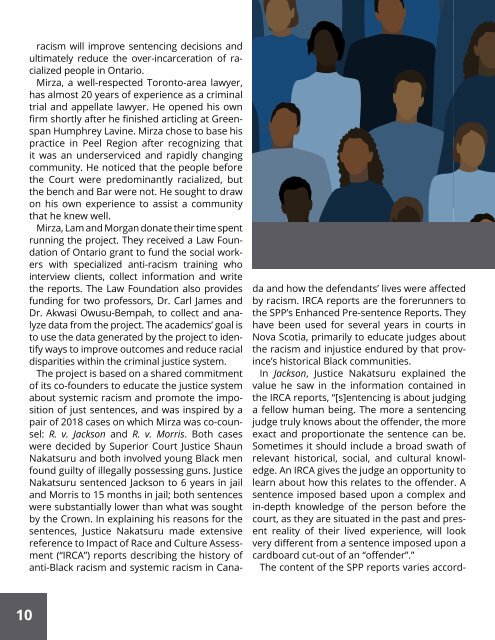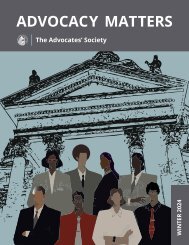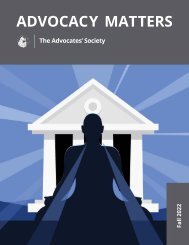Advocacy Matters - Summer 2020
Keep up to date on what your fellow Society members have to say in Advocacy Matters.
Keep up to date on what your fellow Society members have to say in Advocacy Matters.
Create successful ePaper yourself
Turn your PDF publications into a flip-book with our unique Google optimized e-Paper software.
acism will improve sentencing decisions and<br />
ultimately reduce the over-incarceration of racialized<br />
people in Ontario.<br />
Mirza, a well-respected Toronto-area lawyer,<br />
has almost 20 years of experience as a criminal<br />
trial and appellate lawyer. He opened his own<br />
firm shortly after he finished articling at Greenspan<br />
Humphrey Lavine. Mirza chose to base his<br />
practice in Peel Region after recognizing that<br />
it was an underserviced and rapidly changing<br />
community. He noticed that the people before<br />
the Court were predominantly racialized, but<br />
the bench and Bar were not. He sought to draw<br />
on his own experience to assist a community<br />
that he knew well.<br />
Mirza, Lam and Morgan donate their time spent<br />
running the project. They received a Law Foundation<br />
of Ontario grant to fund the social workers<br />
with specialized anti-racism training who<br />
interview clients, collect information and write<br />
the reports. The Law Foundation also provides<br />
funding for two professors, Dr. Carl James and<br />
Dr. Akwasi Owusu-Bempah, to collect and analyze<br />
data from the project. The academics’ goal is<br />
to use the data generated by the project to identify<br />
ways to improve outcomes and reduce racial<br />
disparities within the criminal justice system.<br />
The project is based on a shared commitment<br />
of its co-founders to educate the justice system<br />
about systemic racism and promote the imposition<br />
of just sentences, and was inspired by a<br />
pair of 2018 cases on which Mirza was co-counsel:<br />
R. v. Jackson and R. v. Morris. Both cases<br />
were decided by Superior Court Justice Shaun<br />
Nakatsuru and both involved young Black men<br />
found guilty of illegally possessing guns. Justice<br />
Nakatsuru sentenced Jackson to 6 years in jail<br />
and Morris to 15 months in jail; both sentences<br />
were substantially lower than what was sought<br />
by the Crown. In explaining his reasons for the<br />
sentences, Justice Nakatsuru made extensive<br />
reference to Impact of Race and Culture Assessment<br />
(“IRCA”) reports describing the history of<br />
anti-Black racism and systemic racism in Canada<br />
and how the defendants’ lives were affected<br />
by racism. IRCA reports are the forerunners to<br />
the SPP’s Enhanced Pre-sentence Reports. They<br />
have been used for several years in courts in<br />
Nova Scotia, primarily to educate judges about<br />
the racism and injustice endured by that province’s<br />
historical Black communities.<br />
In Jackson, Justice Nakatsuru explained the<br />
value he saw in the information contained in<br />
the IRCA reports, “[s]entencing is about judging<br />
a fellow human being. The more a sentencing<br />
judge truly knows about the offender, the more<br />
exact and proportionate the sentence can be.<br />
Sometimes it should include a broad swath of<br />
relevant historical, social, and cultural knowledge.<br />
An IRCA gives the judge an opportunity to<br />
learn about how this relates to the offender. A<br />
sentence imposed based upon a complex and<br />
in-depth knowledge of the person before the<br />
court, as they are situated in the past and present<br />
reality of their lived experience, will look<br />
very different from a sentence imposed upon a<br />
cardboard cut-out of an “offender”.”<br />
The content of the SPP reports varies according<br />
to the nature of the case and the history of<br />
the defendant. The reports often contain evidence<br />
that support a link between the individual<br />
defendant’s personal history and the broader<br />
body of research on how racially biased policies<br />
and historical injustices have harmed Black<br />
people. One example is the disproportionate<br />
impact that Ontario’s academic streaming system<br />
in secondary schools had on the educational<br />
outcomes of racialized children.<br />
While the SPP project is relatively new, Mirza<br />
estimates that they have already worked on<br />
about 20 cases. He points to, as an example of<br />
the project’s work, a recent Brampton Superior<br />
Court sentencing decision in R. v. Kandhai. In<br />
that decision, Justice David Harris noted that<br />
“one’s head would have to be in the sand not<br />
to acknowledge that Mr. Kandhai’s responsibility<br />
is affected in some measure by the racism<br />
and poverty in the community in which<br />
he grew up.” The trial judge said that he gave<br />
significant weight to the effect of that history<br />
on Mr. Kandhai as described in the Enhanced<br />
Pre-sentence Report in determining that 49<br />
months in jail was a fit sentence.<br />
Lam says that the value of these reports is<br />
not only in their direct effect on the length of<br />
the sentence, but also the message they send<br />
to marginalized people that their experience is<br />
being paid attention by judges.<br />
Mirza credits the project’s success so far to<br />
a combination of factors that speak to the justice<br />
system’s increasing embrace of the value of<br />
diversity. Mirza is proud that collaboration between<br />
racialized social workers, academics, and<br />
counsel has produced both quality reports and<br />
advocacy. Likewise, diversity in the judiciary has<br />
contributed to acceptance of the impact of racism.<br />
After working in the areas of sentencing<br />
reform and systemic racism for the past twenty<br />
years with mixed results, Mirza hopes that we<br />
are at a turning point. He believes that mandating<br />
education in this area for current judges together<br />
with increased diversity in the judiciary<br />
will facilitate long-term progress. Ultimately,<br />
advancing these objectives may improve the<br />
perception of the administration of justice for<br />
Black, racialized and Indigenous communities.<br />
10 11


















